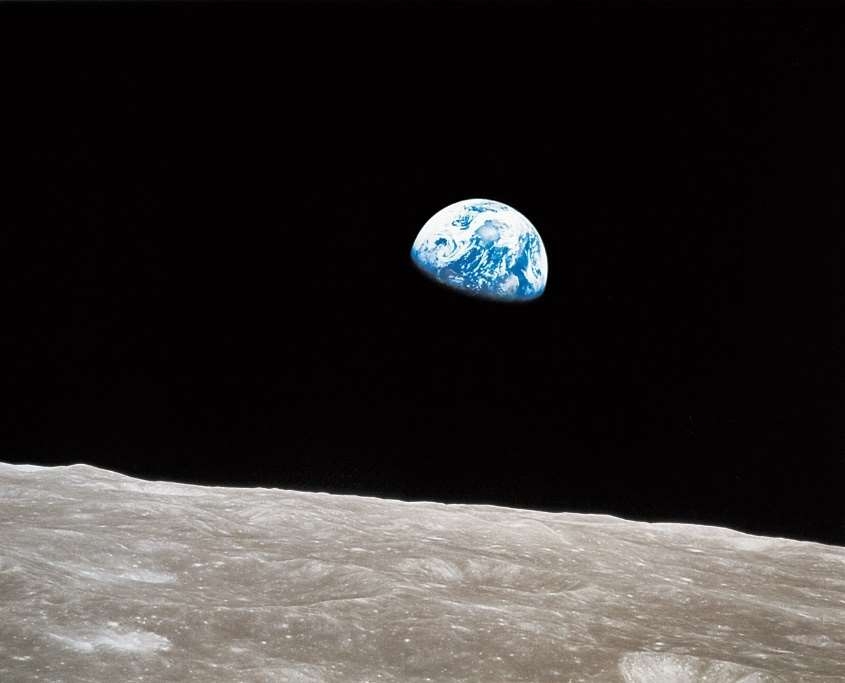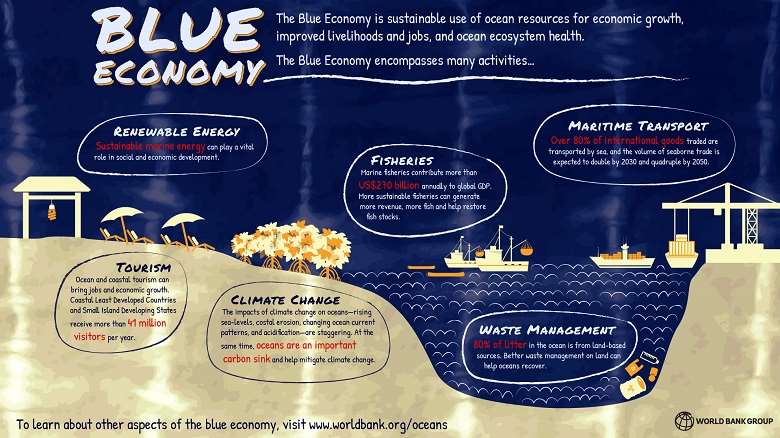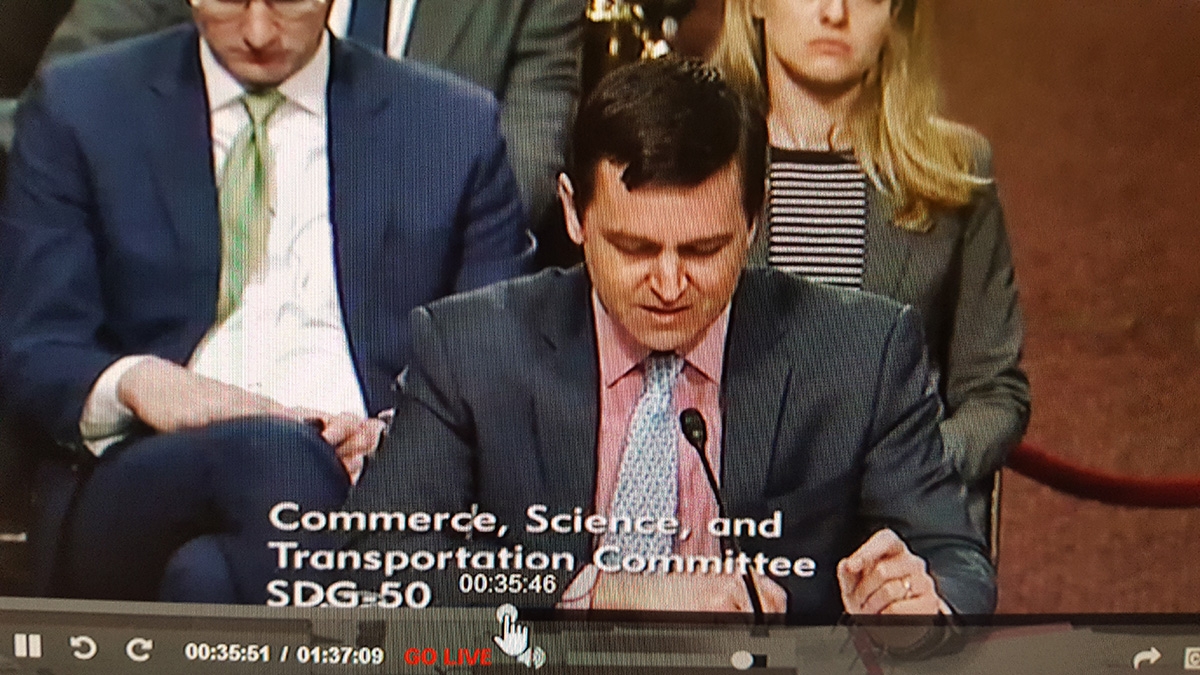Our Blue Economy: Successes and Opportunities

(Credit: N.A.S.A. )
The U.S. Senate Committee on Commerce, Science, and Transportation convened a hearing entitled, “Our Blue Economy: Successes and Opportunities,” on Wednesday, March 27, 2019. Center for the Blue Economy Advisory Council Chair, Mr. Michael Conathan, was there to testify.
The hearing examined stakeholder perspectives on marine economic development and the need for federal investments in ocean technologies and fisheries. Testimony was heard from three speakers: The Honorable Phil Bryant, Governor, State of Mississippi, Mr. Scott Deal, President and Chief Executive Officer, Maverick Boats, and Mr. Michael Conathan, Executive Director, Aspen Institute, Aspen High Seas Initiative.

Michael (Mike) has a long history of advocating for the ocean, and is no stranger to Washington, D.C. He served for five years on the Republican staff of the U.S. Senate Committee on Commerce, Science, and Transportation former subcommittee on Oceans, Atmosphere, Fisheries, and Coast Guard, first as a Knauss Sea Grant Fellow and then as Professional Staff. He went on to serve as Director of Ocean Policy at the Center for American Progress, focused on management of the United States’ ocean resources and the U.S. blue economy.
“Any discussion of the blue economy must begin by acknowledging that our ocean is singular, global, and an inextricable component of the system that allows all life to thrive here on Earth. In short, what happens in the ocean doesn’t stay in the ocean.”
He is currently serving as Executive Director of the Aspen High Seas Initiative, a new program of the Aspen Institute focused on igniting awareness of the urgent need to protect the health of the High Seas and inspiring action at a global scale. Co-Chairs Sylvia Earle and David Shaw established the Aspen High Seas Initiative at the Aspen Institute in partnership with a larger group of ocean and environmental leaders from to worlds of science, policy, and communications to address the existential threats currently facing even the deepest, remotest areas of the global ocean—our final conservation frontier. While people may conceptually understand that we live on an ocean planet, the ocean remains primarily out of sight, and out of mind. Thus, the goals of the Aspen High Seas Initiative are to increase understanding of the global ocean; cultivate a new, diverse set of ocean champions; and inspire world leaders and key decision-makers to protect the High Seas and the ocean at a global scale.
The impact of the oceans on our economy is everywhere.
The Center for the Blue Economy was well represented at the hearing, not only with Mike’s inspiring testimony, but by Governor Bryant as well, who quoted the CBE website in his opening testimony. He noted that the blue economy includes, ” three related but distinct meanings—the overall contribution of the oceans to economies, the need to address the environmental and ecological sustainability of the oceans, and the ocean economy as a growth opportunity for both developed and developing countries.” Mike went on to further refine the definition of the blue economy to emphasize the vital component of sustainability.
Sustainability is not just a buzz word, it’s an imperative.
Although there is no globally accepted definition of the blue economy, the Center for the Blue Economy, the World Bank, the United Nations Development Programme and other U.N. bodies emphasize sustainability as a key element. “When we talk about the blue economy, the focus should be on industries that either contribute to or are dependent on healthy ocean and coastal ecosystems. It necessarily excludes such activities as offshore oil and gas exploration and development, sand and gravel or deep seabed mining, some higher-risk forms of open water aquaculture, and other extractive industries,” states Mike.

“Earth’s ocean is unique in the known universe. It is the single most vital building block for life and ensures that our planet remains habitable. If we fail to treat this system with an abundance of precaution, it won’t just be our blue economy that will suffer in the long run; it will be our entire planetary economy.”
The stakes could not be higher. As Mike points out, “the ocean acts as the lungs of our planet, producing half the oxygen we breathe and absorbing half of the carbon dioxide humans have pumped into the atmosphere. It acts as the heart of our planet circulating heat and nutrients around the globe and ensuring our climate remains livable at all latitudes. And it acts as our liver and kidneys, filtering and absorbing waste. Just like in our bodies, we must take great care not to over tax these systems lest we put them at risk of breaking down. When we think about the blue economy, we must first think in broader terms. If our respiratory, circulatory, and waste filtration systems fail, our entire life support system fails. And so, to extend the metaphor, we must think in terms of a Hippocratic Oath for the ocean: First, do no harm.”
Mike’s written testimony is well laid out, includes many eye opening facts, and is inspiring to read. We can only hope it inspired the lawmakers present to give more funding to ocean research, exploration, and analysis, and that we can in fact reverse course, and do no harm to our oceans and coasts.
For More Information
Read Mike Conathan’s written testimony: “Our Blue Economy: Successes and Opportunities”
View the full Senate Hearing: Our Blue Economy: Successes and Opportunities

